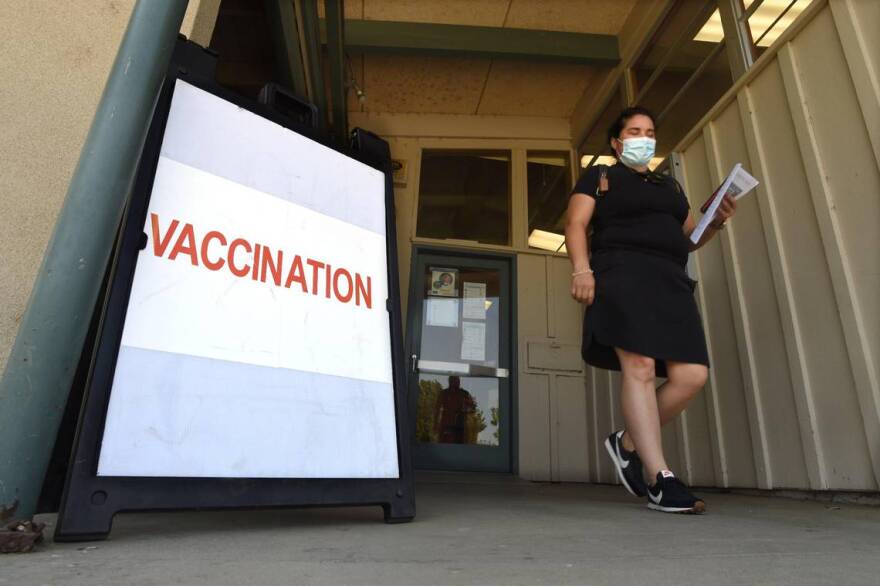It’s a hot Tuesday afternoon in Tipton. Residents from across southern Tulare County stop at the unincorporated community’s only minimart to pick up food or to cash their checks.
Junior Toscano, 29, works in agriculture and lives in Tipton. He walks out of the minimart without a mask and he says he doesn’t have the COVID-19 vaccine either.
“My mom is always telling me to get it but I just haven't done it,” he says.
And he isn’t the only one in the predominantly Latino zip code that isn’t eager to get vaccinated.
As the Delta variant continues to spread across the Central Valley, Tulare County Public Health officials are urging people to get the COVID-19 vaccine. That’s especially true in the areas with extremely low vaccination rates, also known as vaccination deserts.
About 31% of the 3,500 people living in the Tulare County zip code that includes Tipton have been fully vaccinated, according to recent state data. The area’s vaccination rate is lower than both the state’s rate -- at about 63% -- and the county’s. Nearly 35% of all Tulare County residents were fully vaccinated as of Monday, according to county health officials; nearly 43% of all vaccine-eligible residents over age 12 are fully vaccinated.
And it’s no longer an issue of supply. Tulare County has taken steps to site more vaccine clinics in rural areas, and officials say they have seen a slight uptick in vaccination rates in July. But they acknowledge there is still work to do to boost vaccination rates in some pockets of the county.
Low vaccination rates stem from distrust, advocate says

So why do some areas, like the zip code including Tipton, still have such low vaccination rates?
“There's no investment on infrastructure, there's no investment on services,” says Mari Perez-Ruiz, the executive director for the Central Valley Empowerment Alliance, a community-based organization in southern Tulare County.
She says the root cause of low vaccination rates in communities like Tipton is a lack of investment.
“If anything, services are taken away from rural communities and placed in other more affluent communities,” she says.
Perez-Ruiz says the low turnout at vaccination events is a result of decades of distrust in the county's local government.
“It’s a lot of redlining and institutional racism that has been taking place for generations,” she says. “And it's tragic, you know, it's going to take a lot of work for us to correct that.”
Paramvir Sidhu is the chief clinical officer for The Family HealthCare Network, an organization that has participated in vaccine clinics across Tulare County. He says there are several reasons that some Tulare County communities have low vaccination rates.
"Whether somebody is homeless or they don't have the financial or the educational resources or something, they don't have the transportation resources,” he says. “I think that's very much prevalent in our Central Valley.”
He says the county’s public health department has tried to reduce some of those barriers by bringing more vaccine clinics to underserved areas. The next step to boost vaccination rates must be dispelling misinformation about the shot, he says. Especially with the highly transmissible Delta variant spreading through the valley.
“We are seeing an uptick of COVID admissions a little bit, not to the extent like last winter, but I think the general conversation is that the people are saying they wish they would have gotten the vaccine earlier,” he says.
Unvaccinated Tulare County residents cite lack of information, hesitancy
The Central Valley News Collaborative speaks with five people outside the Tipton minimart on an afternoon in mid-July. All of them say they haven’t been vaccinated. No one in their households has gotten the COVID-19 vaccine, either.
A reporter tells one of them, Salah Alamsi, that there is a vaccine clinic taking walk-ins just down the street.
"I've seen signs but I haven't had the chance to go,” Alamsi replies.

Alvaro Saucedo, 38, lives in nearby Earlimart. He says he feels it’s too soon to get the vaccine. He contracted COVID-19 last year but he didn’t get any symptoms. He says that's another reason he doesn't feel the need to get the vaccine, unless he has to.
“Maybe if they require it, well then we’ll have to take it,” he says. “But as long as it’s not required by law, no, I don’t really plan to get it.”
For Janet Pano, a mother of six who lives in the Tipton area, it’s a lack of information. She says she didn’t know the Centers for Disease Control and Prevention was allowing the Johnson & Johnson vaccine to be administered again, following a brief pause. She also didn’t know there were other vaccines she could get instead.
“The more people know, the higher the possibility that they’ll get the vaccine,” she says.
Still, when reporters tell her there is a free, walk-in clinic nearby, she says she doesn’t have the time, showing the challenges Tulare County health officials will face as they try to boost rates in some vaccination deserts.
This story is part of the Central Valley News Collaborative, which is supported by the Central Valley Community Foundation with technology and training support by Microsoft Corp.






